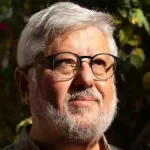Now, with more than 200 Israeli hostages still being held in the Gaza Strip while Israeli forces bombard the enclave in an effort to eradicate Hamas, I spoke with Baskin about what it would take to release those captives, what it’s like to negotiate with Hamas, and whether there is still any hope for peace after what has happened over the last month.
Our conversation has been lightly edited for length and clarity. You can watch part of the interview here.
Gershon, what is the biggest obstacle to securing the release of the more than 200 Israelis who are still held in Gaza?
There are a lot of main obstacles. One is that we’re in an acute, active war with Hamas, where the primary objective of the state of Israel is to eliminate Hamas as a power which can govern the Gaza Strip and continue to threaten Israel.
But at the same time, Hamas is holding about 240 Israeli civilians, women, children, infants, elderly people, sick and wounded. We don’t even know their condition, and there’s no direct contact between the two sides, which means that we have to use third parties to negotiate, each having their own interest and stake in the whole situation on the ground.
So there are a million obstacles. I mean, how do you fight a war against someone that you’re aiming to destroy, and at the same time negotiate with them on the humanitarian release of people that they’re holding?
Meaning, the Israeli government’s objectives of crushing Hamas and freeing the hostages are in conflict with each other?
They are. It’s very difficult to do both, and I think we have a matter of days left for a negotiated agreement to release at least part of the hostages: the women, the children, and the elderly.
It’s believed that [the hostages] are in the southern half of Gaza – and they’re beginning the attack on the southern part of Gaza now.
If there is no negotiated agreement, the Israeli special forces will have to go on search and rescue missions instead.
I assume that some of those will be successful and some will not be successful, and it’s very risky for the lives of soldiers – but Israel cannot leave them behind.
Have you been involved at all in the current negotiations?
I was involved, unofficially of course, at the very beginning, connecting the pieces. We provided telephone numbers to the Qataris of ministers in the Israeli government, and to ministers in the Israeli government of those in Qatar. I’ve also been in touch with five different people in Hamas, none of whom are part of the military command or are decision-makers in this mission to bring the hostages home.
What is your sense of what Hamas wants?
The first thing they want right now is a cease-fire. They believe that the longer they can prolong a cease-fire, the more international pressure will be put on Israel to end the war without completing the mission of eliminating Hamas’ ability to govern.
The second thing that they want is the release of all the Palestinian prisoners in Israel. There are about 7,000 Palestinian prisoners in Israel, including 559 people who are convicted of murdering Israelis and serving life sentences. So we’re dealing with a large number of people who have killed Israelis.
About 30% of the Palestinian prisoners are members of Hamas. Only about 400 of them are from Gaza, the majority are from the West Bank. And the big question is, is any deal possible that would release all the prisoners as Hamas wants?
It seems to me that the only way of getting all the hostages back alive safely is through a deal of “all for all.” But that doesn’t seem possible, knowing the construct of the Israeli government and the mood of the Israeli people.
Talk to me a little bit about that. What is your sense of what the Israeli side wants or is able to concede in any deal with Hamas right now?
Well, it’s very clear that the Israelis want all the hostages returned. I think that what’s being negotiated is called a “humanitarian release” of women, children, and the elderly. In exchange for that, Israel is willing to grant a three to five-day ceasefire.
Israel is probably also willing to release at least the women Palestinian prisoners and those under the age of 18.
Before Oct. 7, there were 43 [Palestinian] women prisoners and about 190 minors. Israel might be willing to release some others as well, but they are very unlikely to release people who have murdered Israelis, and those are the ones that Hamas wants most.
In the past, the Israeli government has released huge numbers of Palestinian prisoners in exchange for quite small numbers of Israeli hostages. The deal you negotiated to free Gilad Shalit, for example, involved more than a 1,000 jailed Palestinians. Why is that, and how does it shape what Israel is willing to do in a situation like this?
There were 1,027 prisoners released [in the Shalit deal], including more than 300 who had killed Israelis, including four people who killed my wife’s cousin. So this is really personal, in fact.
There’s an ethos in Israel that we don’t leave anyone behind. The sense is that in order for Israel to have a “people’s army” as it believes that it has, we have to make good on the promise that we don’t leave anyone behind.
And that was something that was well-known when Gilad Shalit was abducted in June of 2006. It took five years of pressure on the Israeli government of Benjamin Netanyahu, who was then prime minister as well, to make the deal. And in the end, Netanyahu – who wrote the book on not negotiating with terrorists – gave in and negotiated with terrorists and made this big prisoner release.
Today this is an entirely unprecedented situation. Most of the hostages are infants, eight- or nine-month-old babies, senior citizens in their eighties, and obviously Israel is willing to pay a high price for their release, but not the price that Hamas wants.
This is very problematic because should the public in Israel understand that Israel is willing to sacrifice the hostages in order to complete the military mission of dismantling Hamas – as some of the right-wing members of Netanyahu’s governments have said they want to do – I think this would break Israeli society in a moral way that it would be impossible to heal.
It would take generations to heal the pain and the belief that the government did not do everything possible to save these hostages.
As we’re speaking today, there are rumors of a possible hostage deal in the works. What have you heard, and what do you make of it?
My word of advice on everything that we hear about the negotiations and possible deals is to ignore it. These leaks in the negotiations about possible deals are psychological warfare. There are no leaks. These are highly secretive negotiations taking place in closed rooms with very few people in the inner circle. When there is a deal, it will be announced, it will be formally known. All the rest is just noise.
Let me ask you about your experience of negotiating with Hamas. How did you establish a rapport in those talks?
The main thing that worked in the past was time. Time to develop a relationship primarily between myself and my interlocutor, who was Ghazi Hamad, who has been the spokesperson of this [current] war for Hamas. And he crossed that line between humanity and what’s beyond humanity in some of the statements that he’s made since being the spokesperson for this war.
But Ghazi and I have known each other for years. Seventeen years, in fact. We’ve spoken more than a thousand times. We met face-to-face four times. We’ve carried on discussions through wartime and through peacetime – or not “peacetime,” so much as through calm periods.
We’ve talked about life and family and friends and what our purpose is on this planet. In the end, it was the trust that developed between us that enabled us to expose all of our cards and get away from the traditional Middle East zero-sum bazaar negotiations to more of a sharing type of negotiation, where both sides could get most of what they wanted – or most of what the other could give.
I’m sort of curious about the basic details of what happens in the room when you sit down for a hostage negotiation with Hamas? Like, both sides show up, they sit down … then what? Who speaks first? Do they serve coffee? What happens?
Most of it wasn’t done in a room. Most of our negotiations were done by telephone, by SMS. We didn’t have WhatsApp in those days. We did some Skype phone calls. We did meet face-to-face several times, twice in Gaza and twice in Egypt.
We produced a document in mid-July, 2011. The negotiations then moved to Egypt, and the Egyptian military intelligence took over those negotiations. And in the final days when they were going over the list of names [of Palestinian prisoners to be released by Israel], the Hamas negotiating team was in one room at an intelligence base in Cairo, and the Israeli team was in another room, and the Egyptian intelligence guys were going back and forth between the two rooms.
The Israelis and the Hamas people never actually sat together, never shook a hand together. The Israeli side demanded that the Hamas side sign the paper that was agreed upon, and the Egyptians forced Hamas to sign the paper.
They were reluctant to sign it like that, but those are the kinds of negotiations that take place when enemies don’t talk to each other, when they won’t look each other in the eye.
When you were sitting across from Ghazi Hamad, knowing that you were responsible for negotiating the release of a living human being, what went through your head? Were you nervous? Scared? What’s it like?
I tried to develop the kind of rapport that you would have with anyone. I spent time talking to him, for him to tell me his life story, where he comes from, his family, his history, his children, what he believes in life.
We used to joke a lot because he’s a religious Muslim and I’m a secular atheist, and he would always joke at the end of our phone calls that he would pray for me and I would say “inshallah” [Arabic: God willing!].
Was there a moment in your interactions with Hamad that you recall thinking that you had reached a special level of empathy or understanding?
On the day of the exchange in October 2011, as the prisoners were being released to buses that would take them to the border crossing, we spoke to each other around seven o’clock in the morning. We were very happy and pleased and we congratulated each other and Ghazi, maybe it was a slip of the tongue, but he said, “next time we’ll negotiate peace!”
He never repeated that sentence, but it was a moment of happiness, of achievement, of recognizing that we had succeeded in doing the impossible.
You have been active on the Israeli left for many years, advocating for dialogue, for peace, for a two-state solution. Meanwhile, Israel has been moving rightward for more than 20 years. In the wake of Oct. 7, what is the path forward?
For Israelis, this is the most traumatic event that [has] happened since the Holocaust. For the Palestinians, this is the most traumatic event since the 1948 nakba [Arabic: “catastrophe,” when 700,000 Palestinians fled or were driven from their homes in the 1948 Arab-Israeli war.]
We will never forget what happened, what they did to us, what we did to them. This will never be erased from our collective memories, but there is a possibility that at the end of this, we will all make our leaders pay for where they brought us, and we will have what I’ve been calling our Belfast moment, recognizing that in Belfast, it was not a moment, it was a process.
But there came a time in Northern Ireland when the people of Northern Ireland said, “No more – we’re tired of killing each other.”
Originally Published by GZero at https://www.gzeromedia.com/israel/why-israels-war-aims-may-break-israeli-society-a-conversation-with-israeli-hostage-negotiator-gershon-baskin



